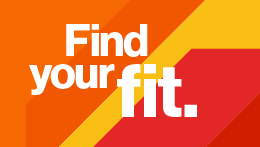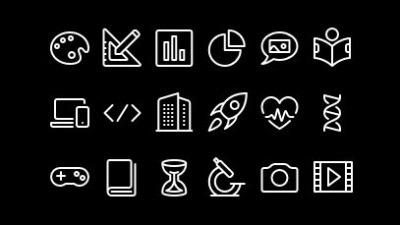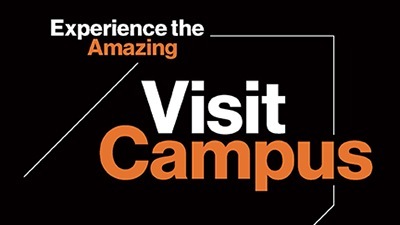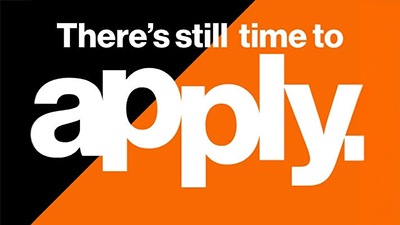Career Exploration Series
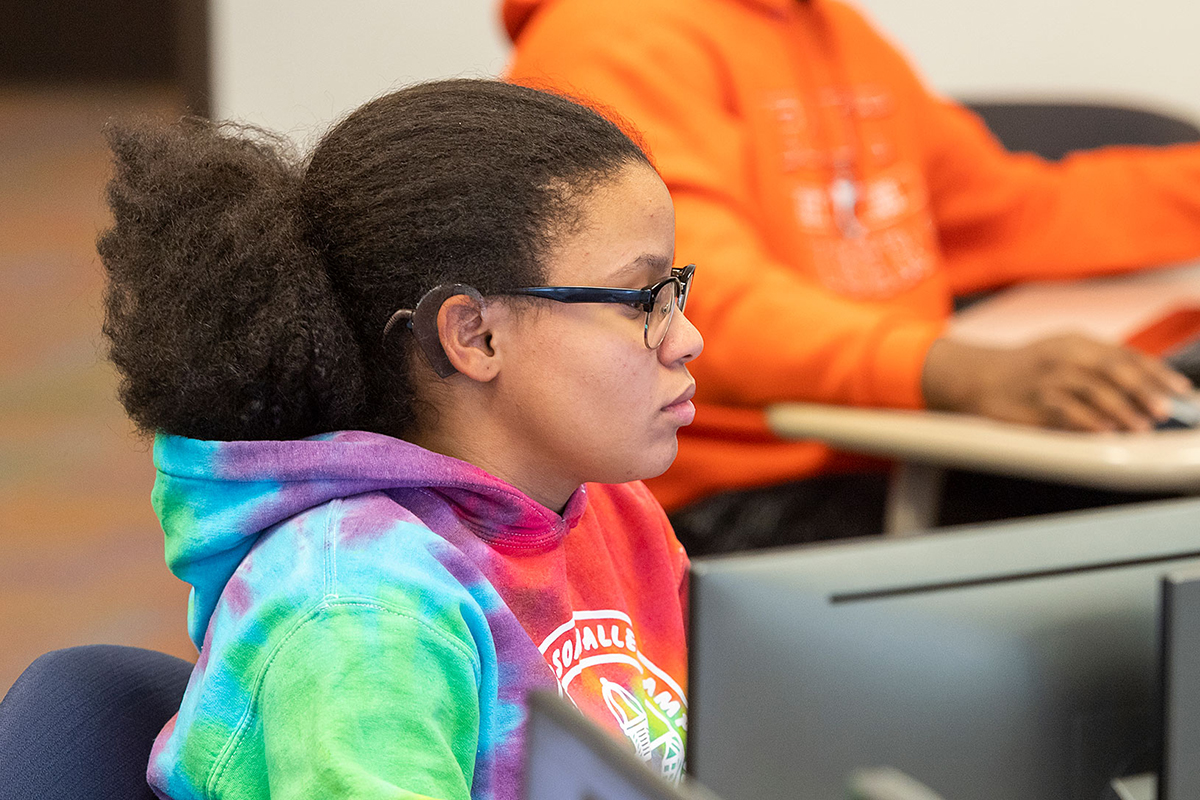
Career Exploration
Series
- RIT/
- National Technical Institute for the Deaf/
- About NTID/
- Programs and Competitions/
- Career Exploration Series
Overview
The Career Exploration Series brings an exciting lineup of interactive virtual webinars tailored for deaf and hard-of-hearing students in grades 6-12. Each semester, we dive into unique career-related topics paired with engaging activities. You'll also discover which college majors can lead you to your dream career.
Upon registration, you'll receive a complimentary box filled with supplies and materials to enhance your webinar experience and continue your exploration afterward.*
Want to revisit past workshops? You can request web links and access in the next section of our website. If you have a specific topic in mind for a new webinar, simply email us at ntidoutreach@rit.edu to submit a request.
*Not all webinars include supplies and materials. Please contact us for more details.
Current Webinars
2025 - 2026 School Year
Upcoming Spring Webinars:
Deaf Brilliance: Stories That Shaped Our World
Joan Naturale
What is this webinar about?
This webinar introduces students to Deaf Studies resources, including InfoGuides, Deaf Studies Archives, and exhibits that highlight Deaf history, culture, and contributions.
What will students learn?
Students will learn how to access reliable information about Deaf people, history, art, theatre, poetry, and literature using academic and archival resources.
Why should students participate?
By exploring Deaf Studies materials, students can deepen their understanding of Deaf experiences and may discover new academic or personal interests.
What careers might this webinar lead to?
Careers in librarianship and library services, including academic, public, school, or special libraries, as well as library support roles that may not require an advanced degree.
Breaking Sound Barriers: Deaf Professional in Manufacturing
Sam Russotto
What is this webinar about?
This webinar introduces students to the world of Manufacturing Engineering, specifically within pharmaceutical and healthcare settings, and provides an overview of how this field supports the production of critical medical products.
What will students learn?
Students will learn how pharmaceutical and healthcare products, such as IV bags, are manufactured and gain insight into the role of a manufacturing engineer in ensuring quality, safety, and regulatory compliance. They will also explore the skills and mindset needed to succeed in this field.
Why should students participate?
Students should participate to better understand how manufacturing engineers combine hands-on problem solving, innovation, and teamwork to create and improve essential healthcare products.
What careers might this webinar lead to?
This webinar may lead to careers such as Manufacturing Engineer, Process Engineer, Automation Engineer, Validation Engineer, Quality Engineer, or Facilities and Equipment Engineer.
Follow Your Dreams and Become your Own Boss by Setting up Your Own Business!
Scot Atkins
What is this webinar about?
This webinar highlights Deaf business owners who transformed their ideas into successful ventures and shares their experiences in establishing and growing their own businesses.
What will students learn?
Students will learn foundational strategies for developing and refining a business idea for the future. Each participant will receive a workbook to guide their thinking, and the session will include discussion on how to use this resource to begin planning and pursuing their entrepreneurial goals.
Why should students participate?
Entrepreneurship is a meaningful career path that offers independence and the opportunity to shape your own professional future. This webinar encourages students to explore business ownership as a viable and empowering option.
What careers might this webinar lead to?
This webinar may inspire careers in entrepreneurship. Students can pursue business ownership in any field aligned with their interests, whether that involves opening a restaurant, launching a service-based company, or creating a product-driven enterprise.
Register for a Webinar Event
We're thrilled to announce new webinars (listed below) as they become available; designed for deaf and hard-of-hearing students in grades 6-12. Each session focuses on a unique and exciting topic, providing engaging experiences and valuable insights into various career paths. You can choose to register for one or all of the webinars.
Each webinar will take place on its scheduled date from 1:00 - 2:00 pm ET.
Recordings will be provided for people who cannot attend.
If you have questions about our webinars or would like to access our archives, please email us at NTIDOutreach@ntid.rit.edu.
Individual Student Registration
Click this button to register a deaf or hard-of-hearing student for a CES webinar. Do not individually register if the student's teacher is registering the whole class.
Teacher Registering a Group
If you are a teacher of a group of deaf/hard-of-hearing students: you do not need to individually register your students, and you should tell your students not to individually register themselves.
Instead, just send us a request to register your whole group. Include the webinar name and date, and a list of your students' full names, grade levels, and email addresses. Send to ntidoutreach@rit.edu and we will register your students for you.
Past Webinars
Missed a webinar or want to revisit a presentation?
All of our webinars are recorded. Just reach out to request access to past sessions.
Social Impact, Business, and Leadership: How Deaf Students Can Build Projects That Change Their Communities
Bakar Ali
What is this webinar about?
This webinar explores how Deaf and hard-of-hearing students can turn real-world challenges into meaningful projects, organizations, or businesses that create positive change in their communities.
What will students learn?
Students will learn how to identify problems, apply basic leadership and teamwork skills, and explore accessible roles in business, social impact, and community development through real-world examples.
Why should students participate?
The skills shared are practical and relevant to any career path, helping students build confidence, experience, and a strong foundation while still in school.
What careers might this webinar lead to?
Careers in nonprofit and community leadership, business and entrepreneurship, public service, education, advocacy, and international development.
Smart Crab Robotics: Build, Test, and Explore
Trisha Gard-Thompson
What is this webinar about?
A fast, hands-on build where students create a tabletop “crab” robot that can side-walk, avoid obstacles/edges, and respond to light—then test and improve its behavior using simple, visual steps.
What will students learn?
Students will learn core robotics and how different parts of a robot contribute to its operation: motors, sensors, power, and chassis.
Why should students participate?
This activity is designed to be fun and highly visual, while also moving quickly. In just 30–45 minutes, participants can build, set their creations in motion, and see immediate results. The process incorporates real engineering principles—testing, measuring, making adjustments, and re-testing—so students actively engage in problem-solving and iterative design.
What will students learn?
- Robotics / Mechatronics technician or engineer
- Automation & Controls, PLC/industrial robotics
- Mechanical or Electrical engineering
- Manufacturing & QA (testing, measurement, fixtures)
- Marine/field robotics (biomimicry, ROVs)
The Future of Data Careers: How AI is Transforming Analysts, Scientists, Engineers, and Architects
Song Hoa Choi
What is this webinar about?
Artificial Intelligence is reshaping the data landscape, changing how professionals analyze, manage, and design information systems. Data analysts now use AI-driven tools for faster insights, data scientists leverage machine learning for deeper predictions, engineers ensure scalable and efficient data pipelines, and architects design AI-ready infrastructures. As automation expands, the demand for critical thinking, ethical decision-making, and adaptability grows. This webinar explores how AI is redefining these roles and what skills will be essential for the future.
What will students learn?
Students will learn about:
- AI’s impact on data careers
- Evolving roles in analytics and engineering
- Future-ready skills for success
- Ethics and adaptability in AI
- Preparing for new opportunities
Why should students participate?
Students will gain insights into the future of data and AI, discover high-demand career skills, learn how to stay competitive in a rapidly changing job market, and connect their knowledge with real-world applications.
What careers might this webinar lead to?
Careers this webinar could inspire:
- Data analyst
- Data scientist
- Statistician
- Biostatistician
- Survey researcher
- Business Intelligence analyst
- Social science research assistant
- Research scientist
- Database architect
Internet of Things: Building a Smart Plant Watering System
Tao Eng
What is the webinar about?
This webinar is about introducing students in grades 6–12 to the Internet of Things (IoT) through a hands-on project. Participants will learn how to build a smart plant watering system, combining sensors, and hardware. The session will include both guided instruction and interactive activities to give students practical experience with IoT concepts.
What will students learn?
Students will learn how to:
- Understand the basics of the Internet of Things (IoT)
- Connect sensors and simple hardware to measure soil moisture
- See how technology can solve real-world problems (like keeping plants healthy)
- Work on a hands-on project they can build and test themselves
Why should students participate?
Students will gain real-world experience with technology while building something fun and useful. This lab helps them understand how everyday problems can be solved with IoT, develop coding and problem-solving skills, and get hands-on practice with hardware. It’s a great way to explore STEM in an interactive and creative way.
What careers might this webinar lead to?
Careers this webinar could inspire:
- Computer Science & Software Development – writing programs and apps
- Cybersecurity – protecting devices and networks
- Data Science – analyzing data from IoT devices
- Electrical & Computer Engineering – designing smart devices and circuits
- Robotics & Automation – building machines that interact with the world
- Smart Agriculture & Environmental Technology – using IoT to improve farming and sustainability
Cholesterol and Blood: How It Affects Your Heart and Health
Viet Le
What is the webinar about?
Cholesterol is something in your blood that can affect how your heart works. In this session, you’ll learn what cholesterol is, why it’s important, and how it can affect your health. We’ll also talk about easy ways to keep your heart healthy and strong.
What will students learn?
- Students will learn how the body uses cholesterol in healthy ways
- Understanding the difference between “good” cholesterol (HDL) and “bad” cholesterol (LDL)
- How too much cholesterol can damage blood vessels.
- They’ll also learn simple ways to keep cholesterol at a healthy level through food, exercise, and lifestyle habits.
Why should students participate?
- This will help students understand how daily choices about food and activity affect their heart health.
- They’ll gain tools to make better decisions for themselves and their families.
What careers might this webinar lead to?
- This topic connects to health-related careers such as doctor, nurse, dietitian, nutritionist, lab technician, and other fields in health science.
The Science of Sports Performance: Using STEM to Boost Athletic Success
Skip Flanagan
What is this webinar about?
- How science and technology are essential to improving sports performance.
- Understanding biomechanics: How the body moves during sports.
- Basics of exercise physiology: How muscles grow and recover after training.
- The role of nutrition: How what we eat affects energy and recovery.
- Technology in sports: Using fitness trackers and data analytics to enhance performance.
- Light mental performance techniques: Simple ways to stay focused and motivated.
What will students learn?
- How STEM (Science, Technology, Engineering, Math) is used in sports.
- How body mechanics and movement can help athletes improve.
- The science behind training and recovery.
- How nutrition fuels the body for peak performance.
- How technology tracks and improves athletic ability.
Why should students participate?
- Interactive learning with opportunities to explore resources to optimize performance.
- Learn how science applies to sports and everyday fitness.
- Explore exciting career paths related to sports science and technology.
What careers might this webinar lead to?
- Exercise Scientist
- Bio mechanist
- Athletic Trainer
- Sports Nutritionist
- Strength and Conditioning Coach
- Sports Engineer
- Sports Technologist
- Researcher
- Performance Data Analyst
Exploring and Interpreting real-world data: Coronavirus Pandemic (COVID-19)
Song Hoa Choi
What is this webinar about?
How did we know that the coronavirus became a pandemic in 2019? The answer is data! This webinar provides graph examples of COVID-19, showing how to interpret the results and draw conclusions.
What will students learn?
- Learn how to explore a real-world data regarding COVID-19 and describe various graphs from articles, journals, newspapers, and other sources.
- Create or identify critical questions, interpret results, and write conclusions.
Why should students participate?
This webinar helps students build their skills in analyzing real-world data and prepare them for fields like social science, politics, science, public health, and others, it is essential for them to first master statistical terminology. Once they learn how to interpret data, they will be ready to step into the world of data analysis.
What careers might this webinar lead to?
- Data analyst
- Data scientist
- Statistician
- Biostatistician
- Survey researcher
- Business Intelligence analyst
- Social science research assistant
- Research scientist
- Database architect
Deaf and Hard-of-Hearing Leaders in History
Denise Kavin
What is this webinar about?
Introducing students to influential, historical Deaf and Hard-of-Hearing individuals who have made significant contributions to various fields.
What will students learn?
After learning about the contributions of Deaf and Hard-of-Hearing leaders across history, students will then learn about the leadership traits and characteristics of successful leaders and supporters. The session will also highlight the new Bachelor of Science program in Community Development and Inclusive Leadership at RIT/NTID.
Why should students participate?
- To learn about the contributions of DHH leaders in history.
- To connect with inspiring stories that relate to their own potential.
- To gain insight into the leadership qualities that have shaped such leaders.
- To learn about the new LEAD program and related opportunities available at RIT/NTID.
What careers might this webinar lead to?
- Leadership and supporting roles in education, technology, business, or community organizations.
- Opportunities to work in Deaf-centric fields such as advocacy, accessibility design, or social work.
A Glimpse Into the CIA
Stacy T.
What is this webinar about?
This webinar gives you an overview of what working at the CIA is like. Students learn about a variety of career opportunities that are available and how to prepare for them.
What will students learn?
- What is our mission?
- How is the CIA structured?
- What does analysis work look like?
- What careers are possible for people who are deaf or hard of hearing?
Why should students participate?
Students will get a look inside opportunities and careers at the CIA. Watching this presentation will help students create a college education plan that will align with our requirements. You’ll learn what a day in the life of a CIA employee looks like!
What careers might this webinar lead to?
We have over 160 positions currently listed on our website. There is a variety of career paths and choices available in the CIA!
Webinar cancelled.
Content Creation in Marketing
Kelly Davis
What is this webinar about?
Explore how content creation has revolutionized marketing and the importance of social media marketing etiquette for influencers and companies.
What will students learn?
- The significance of proper social media marketing etiquette
- The crucial role of content creation in modern marketing
Why should students participate?
Prepare for careers in digital marketing, communications, content creation, and brand management. Stay competitive and informed in today’s rapidly evolving marketing landscape.
What careers might this webinar lead to?
- Digital Marketing & Communications Specialist
- Digital Content Creator
- Marketing Content Creator
- Brand Manager
- Brand Ambassador
